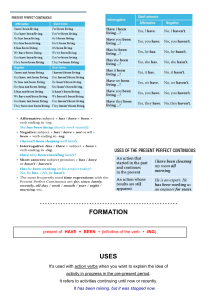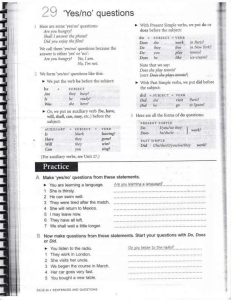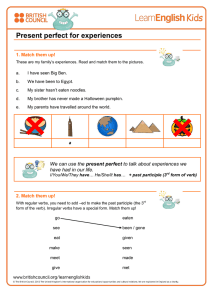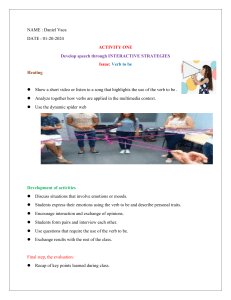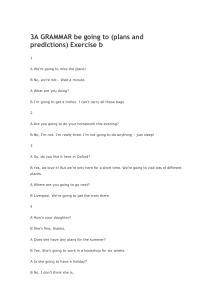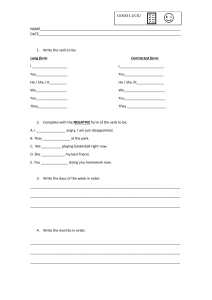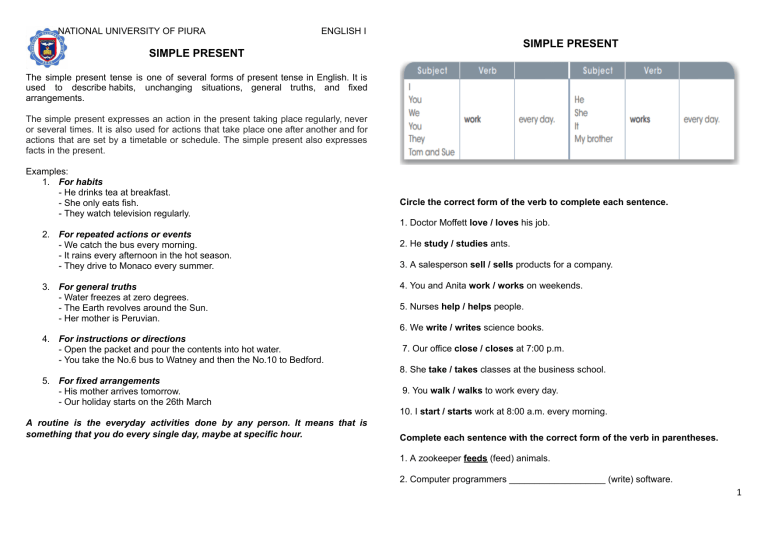
NATIONAL UNIVERSITY OF PIURA ENGLISH I SIMPLE PRESENT SIMPLE PRESENT The simple present tense is one of several forms of present tense in English. It is used to describe habits, unchanging situations, general truths, and fixed arrangements. The simple present expresses an action in the present taking place regularly, never or several times. It is also used for actions that take place one after another and for actions that are set by a timetable or schedule. The simple present also expresses facts in the present. Examples: 1. For habits - He drinks tea at breakfast. - She only eats fish. - They watch television regularly. 2. For repeated actions or events - We catch the bus every morning. - It rains every afternoon in the hot season. - They drive to Monaco every summer. 3. For general truths - Water freezes at zero degrees. - The Earth revolves around the Sun. - Her mother is Peruvian. 4. For instructions or directions - Open the packet and pour the contents into hot water. - You take the No.6 bus to Watney and then the No.10 to Bedford. 5. For fixed arrangements - His mother arrives tomorrow. - Our holiday starts on the 26th March A routine is the everyday activities done by any person. It means that is something that you do every single day, maybe at specific hour. Circle the correct form of the verb to complete each sentence. 1. Doctor Moffett love / loves his job. 2. He study / studies ants. 3. A salesperson sell / sells products for a company. 4. You and Anita work / works on weekends. 5. Nurses help / helps people. 6. We write / writes science books. 7. Our office close / closes at 7:00 p.m. 8. She take / takes classes at the business school. 9. You walk / walks to work every day. 10. I start / starts work at 8:00 a.m. every morning. Complete each sentence with the correct form of the verb in parentheses. 1. A zookeeper feeds (feed) animals. 2. Computer programmers ___________________ (write) software. 1 3. Photographers _________________ (take) photos. 6. bite ________________ 13. like __________________ 4. A chef _______________________ (cook) food. 7. buy ________________ 14. Pay __________________ 5. A firefighter ___________________ (fight) fires. Irregular Verbs: Do, Go, and Have 6. Musicians ____________________ (play) instruments. 7. A farmer _____________________ (work) on a farm. 8. A dancer ______________________(dance) beautiful. Simple Present Spelling Rules: -s and -es Endings 1. Add -s to most verbs. close–closes love–loves stop–stops dance–dances open–opens take–takes exercise–exercises play–plays write–writes feed–feeds put–puts work–works 2.Add -es to verbs ending in -sh, -ch, wash–washes dress–dresses -s, -x, and -z. buzz–buzzes teach–teaches Complete the paragraphs with the correct form of the verbs in parentheses. relax–relaxes Manuel and Lila Vega Manuel and Lila Vega (1) have (have) a busy lifestyle. Manuel 3. Change -y to -i and add -es to verbs carry–carries copy–copies is a doctor at a hospital. He works at night, so he (2) _____________ (go) to work at ending in a consonant + y. study–studies Write each verb with the correct -s, -es, or -ies ending. 1. study studies 8. help __________________ 2. fish ________________ 9. miss __________________ 3. pass ________________ 10. fly __________________ 4. worry ________________ 11. fix __________________ 5. explore ________________ 12. watch __________________ 7:00 p.m. and comes home at 7:00 a.m. His wife Lila works at a bank. She (3) __________ (go) to work at 8:00 a.m. and comes home at 6:00 p.m. They don’t see each other a lot during the week. Manuel and Lila also (4) ______________ (have) two children, Luis and Carla. Every morning they all (5) _____________ (have) breakfast together at 7:30. Then, Luis and Carla (6) __________ (go) to school, and Lila (7) _________ (go) to work. Manuel (8) __________ (do) the dishes, and then (9) ____________(go) to bed. Carla usually (10) ___________ (do) her homework 2 at a friend’s house in the afternoon, and Luis (11) _____________ (have) soccer practice. Manuel gets up at 4:00 p.m. At 6:00 p.m., he (12) __________ (have) dinner with Lila, Luis, and Carla. After dinner, he (13) _____________ (go) to work. Manuel and Lila (14) __________ (have) a busy schedule during the week, but on weekends they relax. Simple Present: Negative Statements and Contractions Read the article about life on the international space station. notice the words in bold. Life on the Space Station Astronauts on the International Space Station have a busy schedule. Every day When shortening the 3rd person (he, she, it) negative, just remove the o in not and they wake up at 7:00 GMT.(1) From 7:00 to 8:00, they wash up and eat breakfast. At add an apostrophe (‘) does not > doesn’t 8:00 in the morning, they call Ground Control (2) in their countries. After they talk to When creating negative sentences, we usually use the auxiliary verbs don’t and Ground Control, their workday begins. The astronauts don’t do the same thing every doesn’t + the base form of the verb. day. Their schedules change every week. The astronauts don’t work all the time. Note: Save the long forms (do not, and does not) for when you want to create Each day they exercise for an hour in the morning and an hour in the afternoon. emphasis. When speaking, put the stress on ‘not’. After dinner, they have free time. Then, it’s time to go to sleep. Sometimes this isn’t easy because the sun rises and sets 16 times each day on the space station. The astronauts’ work doesn’t end on Friday. They work a half day on Saturday and all day on Sunday. Astronauts are very busy people. 1 GMT: Greenwich Mean Time 2 Ground Control: People on Earth who work with astronauts in space. Simple Present: Negative Statements 3 Examples: Questions in the Present Simple 1. I don’t like the food they serve at that restaurant. 2. Jim doesn’t work on Fridays. 3. My friends don’t usually leave so early. 4. I do not want to go with you! Yes- no questions To create a question that will be answered with a yes or no, start the question with Do or Does, then add a subject (the person or thing that does the action) followed by the base form of the verb and only then add the rest of the sentence. Circle doesn’t or don’t to complete each sentence. 1. An astronaut on the International Space Station doesn’t / don’t have a lot of free time. 2. Astronauts doesn’t / don’t work all day on Saturday. 3. An astronaut doesn’t / don’t have the same schedule every day. 4. We doesn’t / don’t work on weekends. 5. I doesn’t / don’t work in an office. 6. My office doesn’t / don’t have a window. 7. She doesn’t / don’t travel for her job. 8. You doesn’t / don’t have a busy schedule Examples 1. Do you surf the Internet every day? 2. Does your boss give you positive feedback? 3. Does Jonathan always turn off the lights? 4. Don’t you ever clean your room? Change each affirmative statement to a negative statement. Wh-Questions in the Present Simple 1. My brother has a job. My brother doesn’t have a job. Wh- questions are questions that require more information in their answers. Typical 2. I drive to work. ________________________________________ wh- words are what, where, when, why, who, how, how many, how much. 3. Pilots fix planes. ________________________________________ To create a wh-question, start with the wh-word, then add do or does, then the 4. Our teacher does homework. ________________________________________ subject (a person or thing that does the action), followed by the base form of the 5. I go to the gym in the morning. _______________________________________ verb and only then add the rest of the sentence. 6. We have class on Sunday. _________________________________________ 7. You teach biology. _________________________________________ 8. We have an exam on Saturday night. ___________________________________ 4 5. A sentence can have more than one prepositional phrase. Examples: 1. Where do you work? 2. What does he do? 3. How do they come here? 4. When do we start? 5. Why do they play football so late? 6. What does she like doing at the weekend? 7. When do you go to the cinema? 8. When do we leave? Prepositions of Time 1. Many time expressions are prepositional phrases. A prepositional phrase is a preposition + a noun. at three-thirty in the afternoon at night on Sunday 2. Remember: Use at with specific times and in the phrase at night. Use in with morning, afternoon, and evening. Use on with days of the week and specific dates. The bank opens at nine o’clock. We relax at night. We go to work in the morning. We eat dinner in the evening. I don’t work on Saturday. The meeting is on Monday afternoon. His birthday is on November 25th. 3. To show when an activity begins and ends, use from . . . to. She works from nine to five-thirty. 4. Use until to talk about an activity that continues up to a specific time. The bank is open until four o’clock. He wakes up at five-thirty in the morning. Underline the prepositional phrases in these sentences. 1. We have class from 9:40 to 10:50. 2. On Wednesday, I have class until 3:30. 3. The party is on Saturday night. 4. The meeting doesn’t end until 3:00. 5. My workweek is from Monday to Friday. 6. I work from 9:00 to 7:00 on Tuesday and Wednesday. 7. I don’t work on weekends. 8. She doesn’t get home until 4:00 in the afternoon. Complete each sentence with the correct preposition(s). 1. She works at night. 2. The meeting is ______________Wednesday afternoon. 3. I sleep _________ 9:30 _______the morning ________ Saturday. 4. I work ________ Monday ___________Friday. 5. Class starts ________8:30 _________the morning. 6. We study ______night. 7. The library is open________ eleven o’clock_________ night. 8. I have lunch _________12:00 ________1:00 every day. 9. She goes to bed ________1:00 a.m. __________Friday and Saturday. 10. We have a break _________10:30 _________ 10:45 __________ morning. 5 Like, Need, and Want + Infinitive _____________________________________________________________ 6. want / watch / to / the game / We _____________________________________________________________ 7. to / He / study / in the library / likes _____________________________________________________________ 8. need / I / do / my homework / to ______________________________________________________________ 9. need / I / my / call / mother / to ______________________________________________________________ 10.ask / to / wants / a / She / question _______________________________________________________________ Put the words in the correct order to make sentences. 1. Saturday / to / work / They / need / on They need to work on Saturday. 2. He / have / lunch / wants / at / 1:00 / to __________________________________________________________ 3. tonight / to / need / work / until / 7:00 / You _____________________________________________________________ 4. need / buy / I / to / computer / a / new _____________________________________________________________ 5. She / play / to / likes / tennis 6 7
